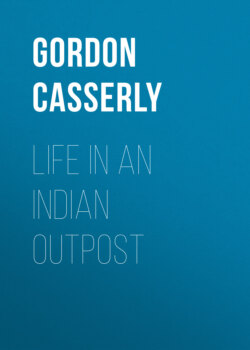Читать книгу Life in an Indian Outpost - Gordon Casserly - Страница 6
На сайте Литреса книга снята с продажи.
ОглавлениеBUXA DUAR. My bungalow in the foreground; the Officers' Mess among the trees.
"THE FORT WAS BUILT ON A KNOLL."
Beside the bazaar was the European cemetery, a mournful enclosure which was dotted with ruinous tombstones of British officers who had been killed or died of disease in this solitary outpost. The most recent grave was that of a former forest officer of Rajabhatkawa who, unable to bear the loneliness of his isolated life, had shot himself in his house in the jungle below. But before our detachment left Buxa another grave was dug here to hold the body of a young captain of my regiment. Though he died of disease, with no doctor there at the time to attend him, yet it was in reality loneliness that killed him; for, depressed by the solitude, he had no heart in him to fight against illness. But the far-flung boundaries of England's Empire are marked everywhere by graves like his.
From the south wall of the fort the ground fell in wooded spurs and rocky cliffs to the forest fifteen hundred feet below. East and west the interminable miles of trees ran on beyond the range of sight, clothing the foot-hills and climbing the steep mountain sides. Here and there a light green island in the darker-hued sea of foliage showed where a tea garden lay in a clearing, the iron-roofed factories, and the planters' bungalows visible through a field-glass. But to the south, beyond the clearly defined edge of the forest, the cultivated plains of Eastern Bengal stretched unbroken to Calcutta—three hundred miles away. South-west, in the Rains when the Indian atmosphere is clearest, we could see the Garo Hills fifty miles away in Assam, lying beyond the broad Brahmaputra where it flows to join the Ganges and pour their united waters through a hundred mouths into the Bay of Bengal—close on four hundred miles to the south of us.
